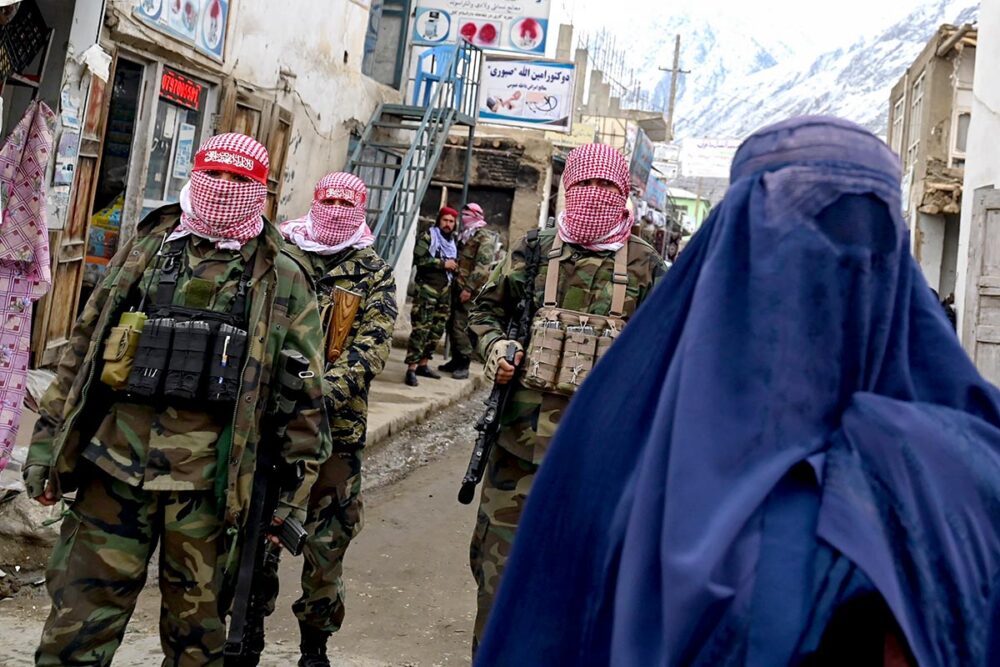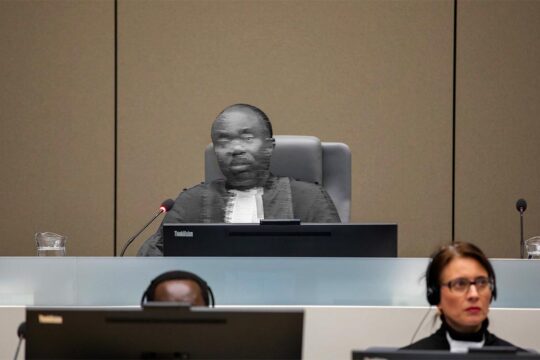“They do not have freedom of association they do not have freedom of speech. They are not allowed to go beyond a certain parameter outside their own homes without some male member of the family acting as a consort. They are not allowed to have an education. They are not even allowed now to go to beauticians or tailors. They are limited in the access they have to proper health care. This is about the fundamental denial of women’s rights and it has come about through the passing of decrees by the Taliban. It’s institutionalized.” This is the litany of violations against Afghan women listed by Helena Kennedy, an experienced international lawyer and member of the British House of Lords who has longstanding contacts with Afghan women.
Women and girls are also being forced into early marriages, and the Taliban have dissolved all mechanisms to protect them against an extremely high rate of domestic violence, exiled Afghan activist Nilofar Ayoubi told Justice Info. She says women in Afghanistan face a “living hell”. “Women have nowhere to go,” she adds. “If they try to run away from home, they have nowhere to run to. If they are caught by Taliban they are sent to prison, where we know what happens to them. Women are being gang-raped, they are being tortured. And if you are a little bit of a good-looking woman and a Talib notices you, then you learn you have no other choice than to become the fourth, fifth wife of this Talib. It doesn’t matter what age you are, or what age he is.”
Afghanistan is the most extreme situation for women, says Kennedy, who led a British parliamentary report into “gender apartheid” in Afghanistan and Iran, released in March 2024. She says she is also gravely concerned about the situation of women in Iran.
Crimes against humanity in Iran
The same month, the UN’s independent Fact-Finding Mission (FFM) on Iran said in its first report that “the violent repression of peaceful protests and pervasive institutional discrimination against women and girls has led to serious human rights violations by the Government of Iran, many amounting to crimes against humanity.”
UN reports are not always so categorical in their qualification of crimes. FFM chair Sara Hossain of Bangladesh explains: “We found that the crimes that occurred were committed as part of a widespread and systematic attack directed against a civilian population, particularly women and girls. And one of the crimes against humanity is persecution on the grounds of gender. We found that those who were protesting -- and in the process essentially supporting demands for gender equality, dignity and freedom in what was known as the ‘Woman, Life, Freedom’ movement -- were targeted as a group. We also found that this group was deprived of their fundamental rights in two ways: one is the existing laws and policies that uphold structural and institutional discrimination on the basis of gender; and secondly by the enforcement of those laws and policies.”
The UN fact-finding mission was set up to investigate alleged human rights violations in Iran “related to the protests that began on 16 September 2022, especially with respect to women and children”. The protests were triggered by the death in custody of Jina Mahsa Amini, a young Iranian-Kurdish woman, after her arrest for allegedly not wearing “properly” the mandatory hijab.
“The first issue about the mandatory hijab is that there is no clear definition of what that means, so it’s very much in the eye of the beholder,” Hossain told Justice Info. “And secondly, the consequence of not wearing mandatory hijab is grossly disproportionate. Under existing laws, women can be deprived of education, access to certain public spaces, health and even employment -- because even private employers are told they are also responsible for enforcing the mandatory hijab on their employees or they cannot work.”
Gender persecution not much prosecuted
The Rome Statute of the International Criminal Court (ICC) provides for the crime of gender persecution as a crime against humanity. It includes “persecution against any identifiable group or collectivity on political, racial, national, ethnic, cultural, religious, gender or other grounds”. Gender is defined as “the two sexes, male and female, within the context of society”. Persecution, according to the Statute, means “the intentional and severe deprivation of fundamental rights (…) by reason of the identity of the group or collectivity”.
This means all States that are party to the ICC (Iran is not, but Afghanistan is) have a duty to include gender persecution, along with the other Rome Statute crimes, in their national law. It has not been tested much, but the ICC has one case pending where the prosecutor has argued persecution on both religious and gender grounds, the Al Hassan case. The Malian Al Hassan has been on trial at the ICC on charges of war crimes and crimes against humanity, including sexual slavery, for his role in Timbuktu, northern Mali, as leader of the religious police in the Ansar Dine group which took control of the city in 2012. His judgment is due to be handed down on June 26.
“Gender apartheid” not yet recognized
Some NGOs and activists are now pushing for “gender apartheid” to be recognized as a crime against humanity in international law. The Rome Statute defines apartheid as “inhumane acts committed in the context of an institutionalized regime of systematic oppression and domination by one racial group over any other racial group or groups”. Gender is not currently mentioned.
Kennedy and the parliamentary inquiry she led are advocating for recognition of gender apartheid. “Some will argue that we already have a crime against humanity in the form of gender persecution, but it isn’t enough,” she told Justice Info. “Women [in Afghanistan and Iran] certainly experience gender persecution in many different ways and it’s very much individualized. What we are looking at here is a State institutionalizing discrimination by removing women’s rights and making it unlawful for them to do certain things which would be perfectly fine if they were a male citizen.”
Kennedy wants gender apartheid included in the Rome Statute and in a new Convention on Crimes against Humanity under discussion at the UN. Ayoubi of Afghanistan agrees. “I was part of the first groups at the UN that started advocating for the term,” she told Justice Info. “We are many in the group. We are advocating for the term gender apartheid because not only in Afghanistan, also in Iran the same thing is happening. What is happening in Afghanistan is clear as day, because half the population is deprived of fundamental human rights just because they are women. If this is not gender apartheid and if the world is not going to punish Taliban leaders, then I don’t think we can have any hope on human rights or justice anymore.”
Universal jurisdiction and humanitarian visas
In the absence of national justice, the Iran Fact-Finding Mission “calls on States to apply the principle of universal jurisdiction to all crimes under international law without procedural limitations”, as well as “establish victim funds, jointly or individually, and provide protection, including by granting asylum and humanitarian visas to those fleeing persecution in Iran in the context of the protests”.
This UN mission has a mandate to collect evidence, and also preserve it for possible future use in legal proceedings. “The information in our report includes the authorities we consider responsible, but we have not given names as yet,” Hossain told Justice Info. These authorities include, for example, the Morality Police, the prison authorities, and the judicial authorities, accused of not giving fair justice to protestors accused of alleged crimes like “corruption on earth” and “enmity to God” as well as “terrorism” and “espionage”. At the end of its mandate in March 2025, the Fact-Finding Mission will submit to the UN High Commissioner for Human Rights a confidential list of suspects.
Change of strategies on Iran and Afghanistan?
Kennedy says the British government has not yet responded to the ad-hoc parliamentary report on “gender apartheid” in Iran and Afghanistan. The UK is currently in an election campaign, with parliament dissolved and a new government expected after the vote on July 4. “We will press any new government” on recognizing gender apartheid, she continues. But the push is not just domestic, she stresses, calling for foreign ministers of States to “use this language”.
Asked about her hopes, Ayoubi does not mince her words. “I might sound harsh, but after what is happening in the world, international justice including the UN sounds like a joke to me. Everything is for political gains,” she said. “To be honest, I am not much hopeful. But I strongly believe that soon States are going to change their strategies and their foreign policies towards the Taliban and the Iranian regime. Iran is waging war in the Middle East and involving the whole world. The Taliban are turning Afghanistan into a terrorist training hub.”








